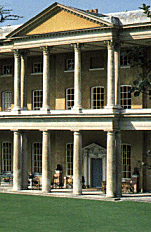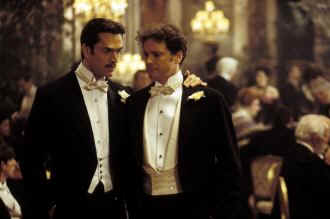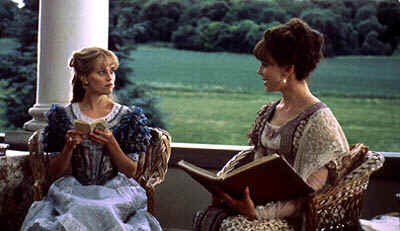|
 =
Wickedly Stylish Adaptation of a Theatrical
Classic =
Wickedly Stylish Adaptation of a Theatrical
Classic
Reviewer: The Rebecca Review.com
Rarely is there a movie that immerses the intellect in
the intense sensuality of sensational sharp sentences. If you
are so inclined, you will drown happily in the witty banter
between the characters.
The Importance of Being Earnest is Oscar Wilde’s
(1854-1900) final and most cherished play. It opened on February
14, 1895 at the St. James Theatre in London.
Wilde's sense of humor and creative genius is fused into a
comic masterpiece guaranteed to “produce vibrations.” The
wit in this cinematic adaptation is superlative and delves into
such ideas as repressed desires and identity. The text has been
updated, but the moments of pure splendor are direct quotes from
the play.
As secrets are unveiled onscreen, the intrigue only
increases. You now enter a world drenched in sexual tension,
snide humor, country manors with sweeping lawns leading to
lakes, crisp lavender letters, spectacular sets, fields of
bluebells, intimate and yet expansive English gardens (West
Wycombe Park), lavish interiors, staircases decorated with
murals by Giuseppe Borgnis, assumed identities, sumptuous
costumes and true love.
London
Algernon Moncrieff (Rupert Everett) appears first as he is
being chased through the back streets of London by his
creditors. You are instantly drawn into the mystery of the
moment and desire to find out more about this character. As he
displays his talents as a Jazz Pianist, we know there is more to
this character than a sheer love for the unfettered life. He
seems to have a romantic streak and a devotion to the forbidden.

The Country
(Filmed in Buckinghamshire at the West Wycombe Park, an 18th
century landscaped garden created by Sir Francis Dashwood.)
Jack Worthing (Colin Firth) is living a double life and is
trying to find his true identity. He adds excitement to his life
by assuming different identities. In town he is “Ernest the
Bachelor” and in the country “Jack the Provincial Justice of
the Peace.” He maintains a bachelor apartment in Albany and a
country estate where he has the responsibility of being guardian
to Cecily. He escapes to London by train, to enter his own
fantasy world where he can flirt recklessly with Gwendolyn
Fairfax who has always imagined she would fall in love with a
man named Ernest and give him her undying devotion.
It is interesting to note that in a world of society drama,
audiences enjoyed seeing images of their own aesthetic paradise
on display. In the Nineteenth Century, many Englishmen were in
fact living the life of “Jack” in the country and
“Ernest” in the city.

Jack seems to falter in the area of romance on numerous
occasions and almost seems locked behind a door of somber
decorum. Gwendolyn breaks from her chains in a “metaphysical
speculation” moment. She represents the inner desires of all
the characters, yet she is the first to take action in the
direction of her dreams. You have to love that she travels with
her diary so she always has something sensational to read.
In the meantime Cecily Cardew (Reese Witherspoon), a sweet
country rose, has built up her own fantasy life complete with
knights and the desire to be rescued from her prison and her
tutor, Miss Prism.
She too desires to find a man named Ernest and willingly
makes up entries in her diary and even writes herself love
letters from her imaginary knight. In her life, “the essence
of romance is uncertainty.” Yet, she truly almost dreams her
knight into life.
The story really centers around two couples and the meddling
Aunt Agusta who is absolutely entertaining. Judi Dench perfects
the role of Lady Bracknell and had played the part before. As
Gwendolen’s mother she assumes the role of protector of her
daughters purity and yet she herself realizes that love
transcends social barriers.
All the characters are living lives in which they at first
seem to be escaping vicariously into their fantasies. The true
awakening comes when they take action to bring these ideas to
fruition.
After Ernest visits London, all the characters end up back in
the country where the real fun begins. After Algernon is tempted
by thoughts of the innocent and beautiful ward Cecily waiting to
be plucked from her country garden, this story becomes a comedy
of errors with clever romantic twists. The mischievous Algernon
pretends to be Jack’s naughty brother and succeeds in
convincing Cecily that he is in fact “Ernest.”
Lady Bracknell’s refusal to allow Ernest to marry her
daughter sets off a series of events which threatens both
couples romantic dreams. Suddenly there are two men named
Ernest. A name known to “inspire absolute confidence.”

Once Cecily meets Gwendolyn they even read one another’s
diaries and give their men a delicious little taunting session
that is both cheeky and wicked.
Oliver Parker includes a poem by Oscar Wilde as a song in
this scene to subtly change the atmosphere from conflict to
passion.
Serenade
The western wind is blowing fair
Across the dark Aegean sea,
And at the secret marble stair
My Tyrian galley waits for thee.
Come down! the purple sail is spread,
The watchman sleeps within the town,
O leave thy lily-flowered bed,
O Lady mine come down, come down!
-Oscar Wilde
Wilde was known for his wit and penchant for lilies. He was
often seen strolling through Picadilly Circus in London wearing
a velvet coat, silk stockings and a lily in hand. As
a tribute, men and women wore lilies to the performances in
London.
Director Oliver Parker has added a beautiful touch of
flamboyance to this film. This movie is best viewed with an
unprejudiced eye. Perhaps it is true that ”Ignorance is like a
delicate exotic fruit; touch it and the bloom is gone.” The
less you know about the play the more you might enjoy this film.
This movie is a beautiful ripe peach dripping with delicious
English wit.
Rather Delicious Actually! |